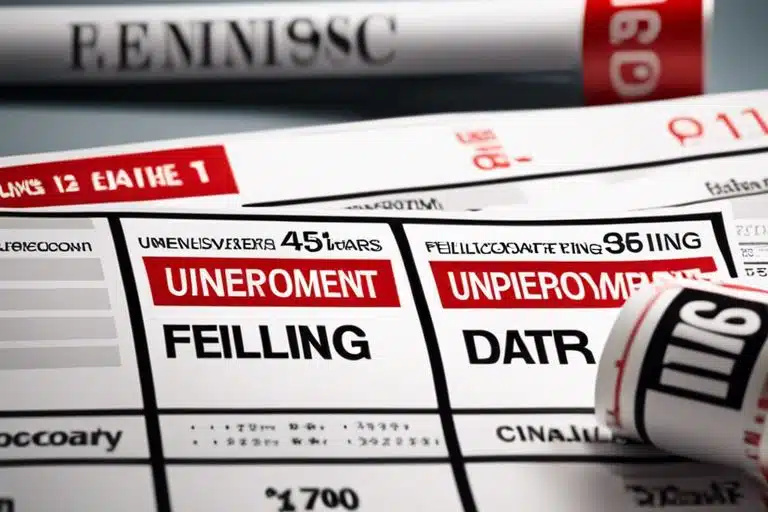Table of Contents
Toggle#job seekers, one of the most critical aspects of navigating through a job loss is understanding the timeline for filing for unemployment benefits. This process can vary depending on your location, so it’s crucial to act swiftly and decisively to ensure you receive the support you need.
Knowing how long you have to file for unemployment after losing your job can make a significant difference in your financial stability. In this guide, we will explore the timelines you need to be aware of, the potential pitfalls to avoid, and the steps you can take to maximize your chances of receiving benefits. Let’s dive in and take control of your future, #job warriors!
Key Takeaways:
- Act quickly: It is crucial to file for unemployment benefits as soon as possible after losing your job to avoid any delays in receiving benefits.
- Check your state’s deadlines: Each state has a different deadline for filing for unemployment benefits. Make sure you are aware of your state’s specific deadline.
- Don’t wait too long: Waiting too long to file for unemployment benefits may result in a loss of potential benefits you are entitled to.
- Be prepared: Have all necessary documentation ready when filing for unemployment, such as proof of employment and reason for separation.
- File online if possible: Many states allow you to file for unemployment benefits online, which can be faster and more convenient than filing in person or over the phone.
- Stay informed: Keep up to date with any changes in unemployment policies and deadlines to ensure you don’t miss out on benefits you may be eligible for.
- Seek assistance if needed: If you have any questions or need help with filing for unemployment benefits, reach out to your state’s unemployment office or a professional for guidance.


How-to Kickstart the Unemployment Filing Process: Don’t Sleep on This!
The Clock’s Ticking: Understanding the Urgency
Even before you lose your job, the clock is ticking on the time you have to file for unemployment benefits. As soon as you find yourself out of work, you must act swiftly to start the process. Time is of the essence when it comes to getting the financial support you need to bridge the gap until you secure your next opportunity.
Don’t wait around thinking you can take your time to file for unemployment. State laws dictate specific deadlines for filing after job loss, and missing these deadlines could result in a delay or denial of benefits. Take control of the situation and start the process as soon as possible to ensure you don’t miss out on important financial assistance.
First Moves: Gathering the Arsenal of Information and Documents
Some of the first moves you need to make involve gathering all the necessary information and documents required for the unemployment filing process. This includes details such as your social security number, previous employment history, and any other relevant documentation needed to prove your eligibility for benefits.
With so much at stake, it’s crucial to stay organized and proactive in preparing all the required information. Make sure to double-check everything before submitting your application to avoid any delays or complications in receiving the financial support you rightfully deserve.
Nailing the Timing: When to Pull the Trigger on Your Unemployment Claim
Many people wonder when the best time is to file for unemployment after losing a job. Timing is crucial when it comes to maximizing your benefits and ensuring a smooth transition during this challenging period. The key is to strike while the iron is hot and file for unemployment during the optimal window for the best results.
The Golden Window: Peak Times to File for Unemployment
Pull the trigger on your unemployment claim during the first week after losing your job. This is the golden window where you can potentially receive the maximum benefits without any delay. By filing early, you signal to the authorities that you are actively seeking assistance and are serious about your job loss situation.
During times of economic uncertainty, such as the current global crisis, it’s even more critical to file for unemployment promptly. The system may be overwhelmed with claims, so being ahead of the curve can help you secure your benefits faster. Timing is everything, and acting swiftly can make a significant impact on your financial stability.
Late to the Party: Consequences of Delayed Filing
Claiming unemployment benefits late can have severe consequences on your financial well-being. Every day you delay filing is a day of potential benefits lost. Delaying your claim may result in reduced benefits or even ineligibility due to missed deadlines or specific requirements.
Unemployment is a safety net designed to support individuals during job transitions, and any delay in filing can prolong your financial uncertainty. Being proactive and filing for unemployment as soon as possible can help you bridge the gap until you secure your next employment opportunity.
Factors Influencing Your Claim: What’s in Your Control, What’s Not
Now, when it comes to filing for unemployment benefits, there are certain factors that can greatly influence the success of your claim. Understanding what’s in your control and what’s not can make a significant difference in your ability to secure the financial assistance you need. It’s vital to be aware of the following:
- State Laws: Each state has its own set of rules and regulations when it comes to collecting unemployment benefits. These laws dictate the eligibility requirements, benefit amounts, and duration of benefits. It’s crucial to familiarize yourself with the specific regulations in your state to ensure you meet all the necessary criteria.
- The Ripple Effects: Your employment history and circumstances play a significant role in determining your eligibility for unemployment benefits. Factors such as the reason for your separation from your job, your length of employment, and your earnings can all impact your claim.
State Laws: The Battlefield Rules that Shape Your Claim
For many individuals, navigating through the intricacies of unemployment laws can be challenging. These laws often vary from state to state, making it vital to understand the specific requirements in your jurisdiction. From the number of hours worked to the reason for separation from your job, each rule can significantly impact your claim. It’s crucial to familiarize yourself with the regulations to ensure you maximize your chances of receiving benefits.
The Ripple Effects: How Your Employment History and Circumstances Weigh In
You can’t control every aspect of your employment history, but you can take steps to position yourself for success when filing for unemployment benefits. Factors such as the length of your employment, your earnings, and the circumstances of your job loss can all influence the outcome of your claim. By understanding how these elements weigh in, you can better prepare yourself for the process. Assume that having a stable work history and a valid reason for separation can improve your chances of a successful claim.
Tips for a Smooth Filing Experience: Don’t Let the System Play You
Once again, you find yourself at a crossroads, navigating the complex world of unemployment filing. It can be a daunting task, but fear not – with the right approach and mindset, you can breeze through the process and get the benefits you deserve. Here are some tips to help you avoid common pitfalls and come out on top.
- Ensure you file for unemployment benefits as soon as possible after losing your job. Delays can result in missed payments.
- Double-check all the information you provide on your application to avoid delays or denials.
- Follow up regularly with the unemployment office to ensure your claim is being processed in a timely manner.
- Keep detailed records of your job search efforts in case you are required to provide proof of your job-seeking activities.
Insider Tactics: Navigating the Bureaucratic Maze
For a smooth filing experience, it’s crucial to understand how to navigate the bureaucratic maze of the unemployment system. Be proactive in seeking assistance from the unemployment office or a trusted advisor who can guide you through the process. Take the time to familiarize yourself with the system’s rules and requirements, so you can submit a complete and accurate application.
Utilize online resources and tools provided by the unemployment office to streamline the filing process and track the status of your claim. Stay informed about any updates or changes to the system that may affect your eligibility for benefits.
Staying on Your A-Game: Avoiding Common Pitfalls
You have to stay sharp and on top of your game to avoid falling into common pitfalls that could jeopardize your unemployment benefits. Make sure to meet all deadlines and requirements set by the unemployment office to prevent delays or denials. Be honest and transparent in your communications with the office to maintain your credibility and eligibility for benefits.
Your financial stability and well-being depend on your ability to navigate the unemployment system effectively. Don’t let complacency or ignorance lead to missed opportunities or benefits. Stay proactive and vigilant in managing your unemployment claim to ensure a smooth filing experience and secure the support you need during this challenging time.
Aftermath and Expectations: What Happens Post-Filing
The Waiting Game: Timelines and Patience in the Unemployment Arena
For many individuals, filing for unemployment can feel like a daunting process. What happens after you hit submit on your application? The waiting game begins. Timelines for processing unemployment claims can vary depending on the state you are in, so it’s important to arm yourself with patience during this time. While it may feel frustrating to wait, it’s crucial to remain calm and understand that the wheels are in motion.
During the waiting period, take the opportunity to explore other avenues of support. Reach out to career centers, network with professionals in your industry, and consider upskilling or retraining if necessary. Be mindful of, the waiting game is only temporary, and focusing on proactive steps can help keep your momentum going in the right direction.
Possible Outcomes: Deciphering What Comes Next
On the other side of the waiting game lie various outcomes that could shape your next steps. Whether your claim is approved or denied, understanding the possibilities is key to managing your expectations. Approved claims may come with a waiting period before receiving benefits, while denied claims may trigger the need to appeal the decision.
Plus, in some cases, you may be required to attend job search or training programs to continue receiving benefits. Stay informed and be prepared for any scenario that comes your way. Be mindful of, each outcome is a stepping stone towards your next chapter, so approach them with resilience and determination.
The Side Hustle: Planning Your Next Moves Beyond Unemployment
Life After the Claim: Transitioning Back into the Workforce
Despite the challenges of losing your job and filing for unemployment, there is a silver lining waiting for you. Transitioning back into the workforce after a period of unemployment can be daunting, but it is also an opportunity for growth and self-discovery. Take this time to reflect on your skills, passions, and goals. Use this period to reassess what you truly want in a career and how you can leverage your experiences to land a job that aligns with your values.
If you find yourself struggling to re-enter the workforce, consider seeking out additional training or education to enhance your skill set. Networking is also key during this time – reach out to former colleagues, friends, and industry connections to explore potential job opportunities. Note, every rejection brings you one step closer to the right opportunity.
Entrepreneurial Spark: Turning Adversity into Opportunity
If unemployment has opened your eyes to the idea of becoming your own boss, now is the time to pursue that entrepreneurial spark. Use your newfound free time to brainstorm business ideas, research the market, and create a solid business plan. Turning adversity into opportunity is not easy, but it can be incredibly rewarding in the long run.
Now is the time to take action and turn your entrepreneurial dreams into reality. Embrace the uncertainty and challenges that come with starting a business, and use them to fuel your passion and drive. Note, some of the most successful businesses were born out of times of adversity.
Unemployment is not the end of the road; it is a chance for you to reinvent yourself and pursue your dreams. Whether you choose to re-enter the workforce or begin on the entrepreneurial journey, remember that your possibilities are endless. Embrace the opportunities that come your way and keep pushing forward with determination and resilience.
Final Words
The clock is ticking, my friend! Bear in mind, you gotta act fast when it comes to filing for unemployment after losing your job. Don’t procrastinate, don’t wait around. Head over to the New York Department of Labor website and get that application in ASAP. Time is money, and you don’t wanna miss out on those benefits you deserve. Need more guidance? Check out the Before You Apply for Unemployment Frequently Asked Questions page for all the answers you need. Let’s get that money in your pocket, hustle hard!
Also Read : How To Give A Blow Job
FAQs
Q: How long do you have to file for unemployment after losing your job?
A: You should file for unemployment benefits as soon as possible after losing your job. The process can vary by state, but generally, you should file within the first week of becoming unemployed.
Q: What happens if you wait too long to file for unemployment?
A: If you wait too long to file for unemployment, you may risk losing out on benefits. It’s important to file promptly to ensure you receive the assistance you are entitled to.
Q: Can you file for unemployment if you were fired from your job?
A: In most cases, you can still file for unemployment if you were fired from your job. As long as you were not fired for misconduct or other disqualifying reasons, you may be eligible for benefits.
Q: How long does it take to start receiving unemployment benefits after filing?
A: The time it takes to start receiving unemployment benefits can vary, but in general, it can take a few weeks for your application to be processed and approved. Be prepared to wait, but know that help is on the way.
Q: What should you do if your unemployment claim is denied?
A: If your unemployment claim is denied, don’t panic. You have the right to appeal the decision. Make sure to carefully follow the instructions provided and provide any necessary documentation to support your case.





